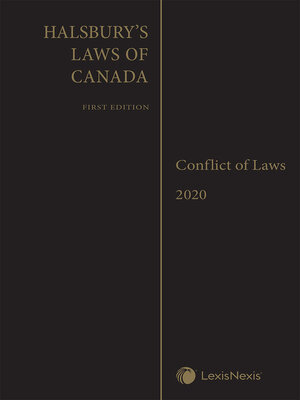Halsbury's Laws of Canada - Conflict of Laws (2024 Reissue)
ebook ∣ Volume 1 · Halsbury's Laws of Canada - Conflict of Laws (2024 Reissue) (1)
By Janet Walker

Sign up to save your library
With an OverDrive account, you can save your favorite libraries for at-a-glance information about availability. Find out more about OverDrive accounts.
Find this title in Libby, the library reading app by OverDrive.



Search for a digital library with this title
Title found at these libraries:
| Library Name | Distance |
|---|---|
| Loading... |
The realities of a global marketplace and shrinking political borders mean that the application and reach of law are seldom confined to a province, a country or even a continent. The field of conflict of laws, also known as private international law, concerns the mechanisms for addressing crossjurisdictional legal conflicts in regard to 3 major areas:
Newly and thoroughly revised, Halsbury's Conflict of Laws (2020 Reissue) analyzes and explains the broad range of conflict questions and rules impacting Canada's 14 jurisdictions, including issues such as:
- Criteria for exercising
- Consent, including attornment, agreement and persons protected from waiver of access to their local courts
- Defendant's forum
- Class proceedings
- Real and substantial connection to forum
- Discretion in exercising jurisdiction
- Limits on jurisdiction, including state, diplomatic, consular, procedural and jurisdictional immunity
- Service outside the jurisdiction
- Security for costs
- Injunctions
- Letters rogatory, including obtaining evidence and interprovincial subpoenas
- Marriage
- Divorces and corollary relief
- Matrimonial property
- Legitimacy, adoption, and parentage
- Custody, access and guardianship
- Support orders
- Mentally incapable adults







